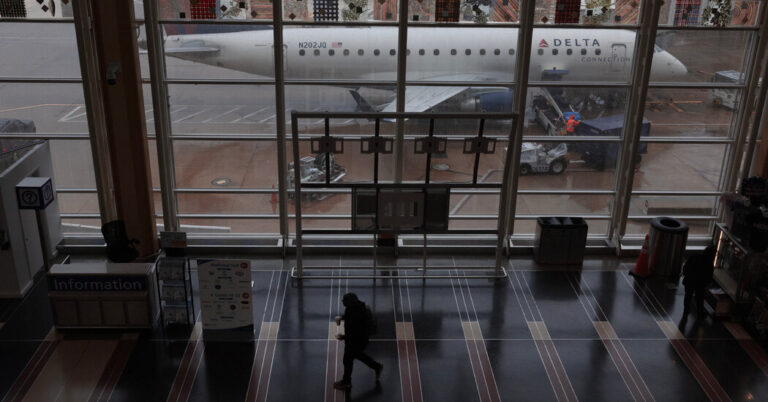The Senate passed legislation Thursday to reauthorize federal aviation programs for the next five years and put in place new safety and consumer protection measures for passengers, at a time of intense uncertainty and disruption of the air transport system.
The law project, which still must gain final approval from the House before becoming law, would provide more than $105 billion to the Federal Aviation Administration and an additional $738 million to the National Transportation Safety Board for airport modernization, technology programs and Security. It would also strengthen the recruitment and training of air traffic controllers, codify airlines’ reimbursement obligations to passengers, guarantee free family seats and strengthen protection for disabled passengers.
“Aviation safety has been top of mind for millions of Americans recently, and this FAA bill is the best thing Congress can do to give Americans the peace of mind they deserve,” he said. said Sen. Chuck Schumer of New York, the majority leader. Senate Chamber Thursday evening.
It passed by an overwhelming bipartisan vote of 88-4, just one day before the current law was scheduled to expire. The Senate also unanimously approved a short-term extension to allow time for the House to pass and approve the longer-term package next week, a move that would send it to President Biden.
The legislation is a bipartisan compromise negotiated for months by the Senate and House committees with jurisdiction over the FAA, after Congress authorized several short-term expansions of the agency when lawmakers missed deadlines previous ones. THE House adopted his version of the bill almost a year ago in a lopsided vote of 351-69.
Sen. Maria Cantwell of Washington, chairwoman of the Commerce Committee, praised the bill’s provisions on consumer protection, aviation safety, air traffic controllers, airport infrastructure and workforce development after its adoption.
“This is a great moment for aviation,” Ms Cantwell said. “We had security issues and concerns about the need to make a big investment. This legislation is that investment – in safety standards, in consumer protections, and in developing a workforce and technology that will enable the United States to be the gold standard for ‘aviation.
Sen. Ted Cruz of Texas, the top Republican on the Commerce Committee, said: “This legislation is a strong, bipartisan, bicameral bill that includes hundreds of priorities for Senators and Representatives, both Republicans and Democrats. . This bill gives the FAA the safety tools it needs at a critical time.
As one of the few remaining bills considered a must-win this year, the FAA package, which has sparked several regional disputes, has become a magnet for dozens of amendments and political elements that threatened to delay it in the Senate.
With legislation threatening to stall, the House approved a one-week extension for the FAA on Wednesday before leaving Washington for the weekend. The Senate followed suit Thursday, sidestepping lingering disputes that threatened to derail the effort and cause a brief FAA failure.
The debate took place at a time of great uncertainty regarding the air system, which has recently experienced a series of worrying episodes such as near-misses On Tracks, aircraft malfunctions And thousands of flight delays and cancellations.
It was unclear for much of Thursday whether the Senate would be able to pass the bill and the extension, as senators demanded a vote on the amendments or threatened to block quick passage. No amendment was ultimately put to the vote.
The most intense regional fight has been over a provision of the bill that add five long-haul round-trip flights from Ronald Reagan National Airport, outside Washington. Supporters of the project, including Delta Air Lines, have said they want to expand access to the nation’s capital and increase competition.
Proposal furious lawmakers representing the region, which argued that the airport has the busiest runway in the country and cannot accommodate additional flights. Senators Tim Kaine and Mark Warner of Virginia and Benjamin L. Cardin and Chris Van Hollen of Maryland, all Democrats, tabled an amendment to hit the new flights.
Mr. Kaine and Mr. Warner threatened to delay the bill if they did not get a vote. But Mr. Cruz blocked efforts to offer a compromise amendment that would have given the transportation secretary final say on new flights after considering the effects they would have on delays and passenger safety.
“The Senate has abdicated its responsibility to protect the safety of the 25 million people who pass through DCA each year,” Mr. Kaine and Mr. Warner said in a statement. “Some of our colleagues were too afraid to let the experts speak. They did not want to show the American people that they care more about the desire of a few legislators for direct flights than the safety and convenience of the traveling public. It’s shameful and embarrassing.
The senators from Virginia and Maryland were the only ones to vote against the bill.
Another group of senators failed to get a vote on a proposal to end the operations of the Transportation Security Administration. expansion of facial recognition technology in airports and restrict its use where it is used.
Senators had also proposed adding a number of unrelated bills, including A this would compensate people harmed by exposure to the country’s nuclear weapons program, legislation to fully finance replacement of collapse Francis Key-Scott Bridge in Baltimore, and a credit card contest measure. Senators Marsha Blackburn, Republican of Tennessee, and Richard Blumenthal, Democrat of Connecticut, were pushing for their bill to protect minors online to be voted on by Thursday. None of them made it into the final product.


